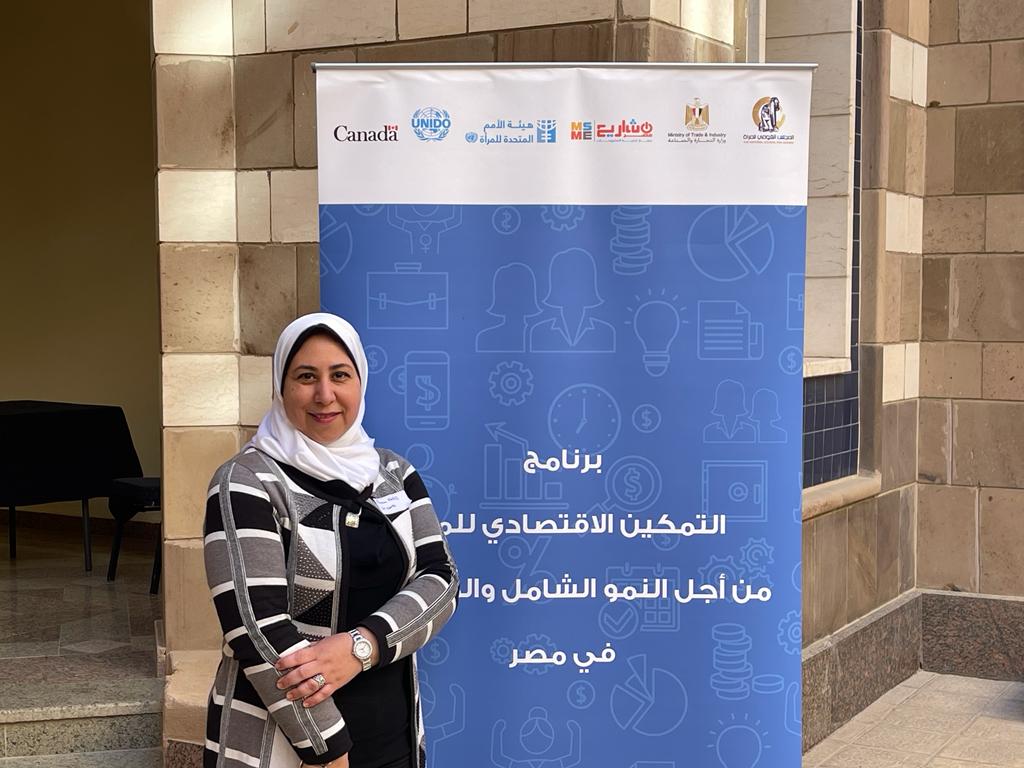From where I stand: “My business aims to produce natural fertilizer for the soil to reduce harmful emissions “
Date:
Ms. Rania Fathy, Environmental and Sustainable Development Consultant and Founder of Dr. Earth, holds a master’s degree in environmental sciences and currently works in the field of environmental, sustainable development. Rania discovered her passion in this field when she was in high school as when participating in conducting research with the Academy of Scientific Research, often focusing on desertification and environmental pollution. Rania is one of the women entrepreneurs who has benefited from the first round of a series of trainings conducted by the AUC Center for Entrepreneurship and Innovation, through the support of the UN Women/UNIDO Joint Programme Rabeha. This work is implemented in partnership with the National Council for Women, the Ministry of Trade and Industry and the Small, Medium and Micro Enterprise Development Agency Microscopy (MSMEDA), with the generous support of the Government of Canada.
To learn more about her company and her opinion on ways to address climate change, we spoke with Rania.

“The main objective of this work is to produce worm compost for the soil - known as 'vermicompost' – which is the product of the decomposition process of various species of worms, creating a mixture of decomposing vegetable or food waste. This benefits all of the agricultural sector, including farmers and plant nursery owners, as they are the main consumers of fertilizers.”
“In Egypt, the agricultural sector currently depends on chemical fertilizers, which are extremely harmful to the environment as they are not nature-based products. The fertilizers we produce are natural, which means that we use the remnants of earthworms after they have eaten organic residues such as food waste, agricultural crops, dry leaves, and others’, says Rania.
“Vermicomposting is considered the best type of organic fertilizer in the world in terms of quality and effectiveness, as it contains many micro-organisms that increase the vitality and fertility of the soil, which positively affects the plants and increases production”, Rania explains. “Moreover, every day in our homes we end up compiling a lot of vegetable and fruit waste and it takes hundreds of years to decompose which result in producing harmful gases to the environment. That’s why my initaitive aims at producing a natural fertilizer in efforts to reduce the harmful emissions that contribute to global warming.”.
“The production of worm fertilizers has several stages. The first stage is to prepare the basins in which the worms and food waste will be placed, then bring the required number of worms, which may be expensive at first, but worms reproduce after a while, so we do not need to rebuy. We also collect food leftovers from vegetable markets such as Al-Obour Market. One of the characteristics of worm fertilizer is that it contains natural vital substances that the soil needs, and it retains moisture for a long time and transfers it to the plant, which increases the yield of agricultural crops and would also hugely reduce the amount of irrigation and water required. In addition, Vermicomposting increases the immunity of plants against diseases and does not pollute the environment.”
We came up with the name "Doctor Earth", noting that it is not the final name yet as we are still doing market-tests on the name. However, on a personal level, I like the name because our project is from the earth (soil) to the earth (planet).
I heard a lot about international donors that support small and medium enterprises, so I searched online and discovered the UN Women/UNIDO “Rabeha” programme. I applied and I was very happy because the application did not require a certain age. I joined the training sessions, which aim to enhance the skills of 1000 women entrepreneurs who had their own business ideas and are searching for ways to turn such ideas into a project [or company]. What I benefited from the most during the trainings were the marketing sessions given my zero experience in this field; in addition to the sessions that focused on improving our skills in the digital field and the tools that can help us grow our business.”
Rania’s advice to women entrepreneurs is to be patient. “I personally believe that women are the driving force of any society and the backbone of any home, whether she is a mother, wife, sister, or play any other role. I also believe that raising the awareness at the community level begins with raising the awareness at home first.”
The cooperation with the Center for Entrepreneurship and Innovation at the School of Business Administration at the American University in Cairo through the Women’s Economic Empowerment Project - Supporting Entrepreneurship” falls within the framework of the joint programme “Women’s Economic Empowerment for Inclusive and Sustainable Growth in Egypt-Rabeha” implemented by UN Women Egypt and the United Nations Industrial Development (UNIDO), in partnership with the National Council for Women, the Ministry of Trade and Industry and the Small, Medium and Micro Enterprise Development Agency, and with the support of the Government of Canada. The programme provides a demand-driven tailored package of services for various actors in the Egyptian labor market by offering capacity building opportunities for female job seekers, women entrepreneurs, private sector companies, male/female investors in cooperation with government institutions, and actors in the labor market.
These efforts contribute to achieving the SDG5: Achieving gender equality and empowering all women and girls, and the SDG13: Climate action by supporting women entrepreneurs and start-ups that contribute to preserving the environment and confronting climate change.